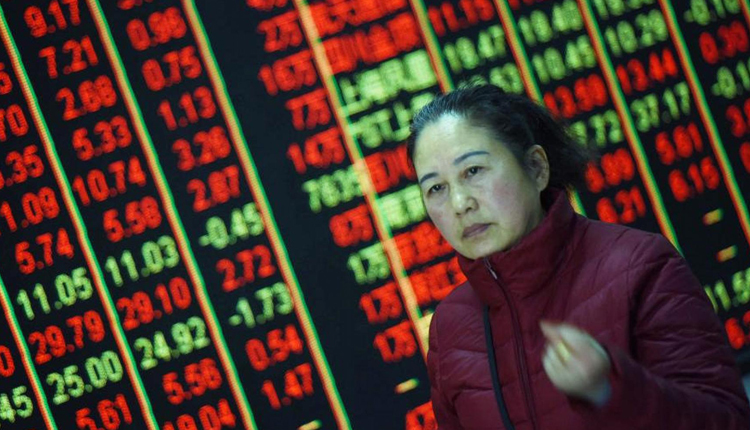Mainland Chinese markets slid by Thursday afternoon, with the other Asian markets following suit, amid a renewed threat to trade.
Shares in mainland China slipped by the afternoon, with the Shanghai composite declining 0.65% and the Shenzhen component down about 1.2%. The Shenzhen composite also fell 1.229%.
Hong Kong’s Hang Seng index declined 0.49%, with shares of Chinese tech giant Tencent dropping 1.27%.
Elsewhere, the Nikkei 225 fell 1.85% as shares of index heavyweights Softbank Group and Fanuc declined. The Topix also dropped 1.99%.
Japan’s exports fell 6.7% in June as compared to a year ago, according to data released on Thursday — against expectations of a 5.6% decline from economists in a Reuters poll.
South Korea’s Kospi declined 0.41% as shares of Celltrion dropped around 2%.
The Bank of Korea announced that it was cutting the base rate by 25 basis points to 1.5%, following a cut to South Korea’s growth target earlier this month, and an ongoing trade spat between Seoul and Tokyo that has seen Japan place import curbs on important materials used by South Korea’s technology sector.
The Korean won bounced 0.26% to 1,176.60 against the dollar, following an earlier low of 1,183.52.
In Australia, the S&P/ASX 200 traded 0.31% lower. Shares of property firm Lendlease surged more than 6% after the company announced it landed a contract from tech giant Alphabet’s Google worth $15 billion in California.
Overall, the MSCI Asia ex-Japan index dipped 0.23%.
Meanwhile, Apple supplier and the world’s largest contract chipmaker Taiwan Semiconductor Manufacturing Company on Thursday posted a 7.6% fall in second-quarter net profit. It said its April-June profit was T$66.765 billion ($2.15 billion) — slightly more than the T$65.92 billion average of 21 analyst estimates compiled by Refinitiv.
Australia jobs data
Australian jobs data released on Thursday showed the country’s unemployment rate remaining at 5.2% in June. Overall, a net 500 new jobs were created in the month, far off the expected 10,000 figure from economists cited by Reuters.
The Australian dollar changed hands at $0.7029, after earlier seeing a low of $0.7003.
The unemployment rate “remains too high,” Marcel Thieliant, senior economist at Capital Economics, told CNBC on Thursday. He added that the Reserve Bank of Australia was unlikely to cut interest rates again in August as the jobless figure “didn’t increase any further.”
Still, he said: “We expect the unemployment rate to creep up over the coming months and that suggests (the Reserve Bank of Australia) will keep cutting interest rates further.” The Australian central bank had brought interest rates to a record low in July.
Renewed trade tensions
Stocks stateside closed at their lows of the day just after the Wall Street Journal reported that trade negotiations with China are at an impasse over restrictions on Huawei, citing people familiar with the talks.
On Tuesday, U.S. President Donald Trump said there’s still a long way to go before a deal with China can be reached, while threatening to slap tariffs on another $325 billion worth of Chinese goods.
“Donald Trump’s renewed trade threats this week undermine relief from the resumption of US-China trade talks agreed to by Presidents Trump and Xi at June’s G20 meeting,” Vishnu Varathan, head of economics and strategy at Mizuho Bank, wrote in a note on Thursday.
“This is a timely reminder that it is too complacent to regard US-China risks as having a short ‘half-life’, which proportionally declines with progress on bi-lateral trade talks,” Varathan said.
Meanwhile, profits posted during the ongoing earnings season stateside were better than expected. More than 7% of S&P 500 companies have reported second-quarter earnings thus far, according to FactSet data. Of those companies, about 85% have posted profits that beat analyst expectations.
Oil and currencies
The U.S. dollar index, which tracks the greenback against a basket of its peers, was at 97.099 seeing an earlier high of 97.210.
The Japanese yen, widely viewed as a safe-haven currency, traded at 107.68 against the dollar after strengthening from levels above 108.0 yesterday.
Oil prices rose in the afternoon of Asian trading hours, with international benchmark Brent crude futures adding 0.27% to $63.83 per barrel, while U.S. crude futures gained slightly to $56.81 per barrel.
Source: CNBC


